Upcycling
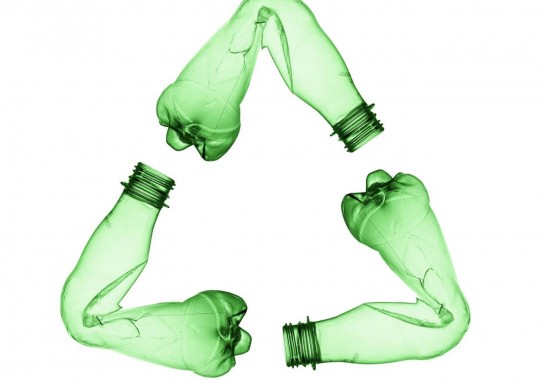
Upcycling is defined as the process of transforming by-products, waste materials, useless, or unwanted products into new materials or products of better quality or environmental value.
Upcycling is the opposite of downcycling, which is the other half of the recycling process.
Upcycling is defined as the process of transforming by-products, waste materials, useless, or unwanted products into new materials or products of better quality or environmental value.
Upcycling is the opposite of downcycling, which is the other half of the recycling process.
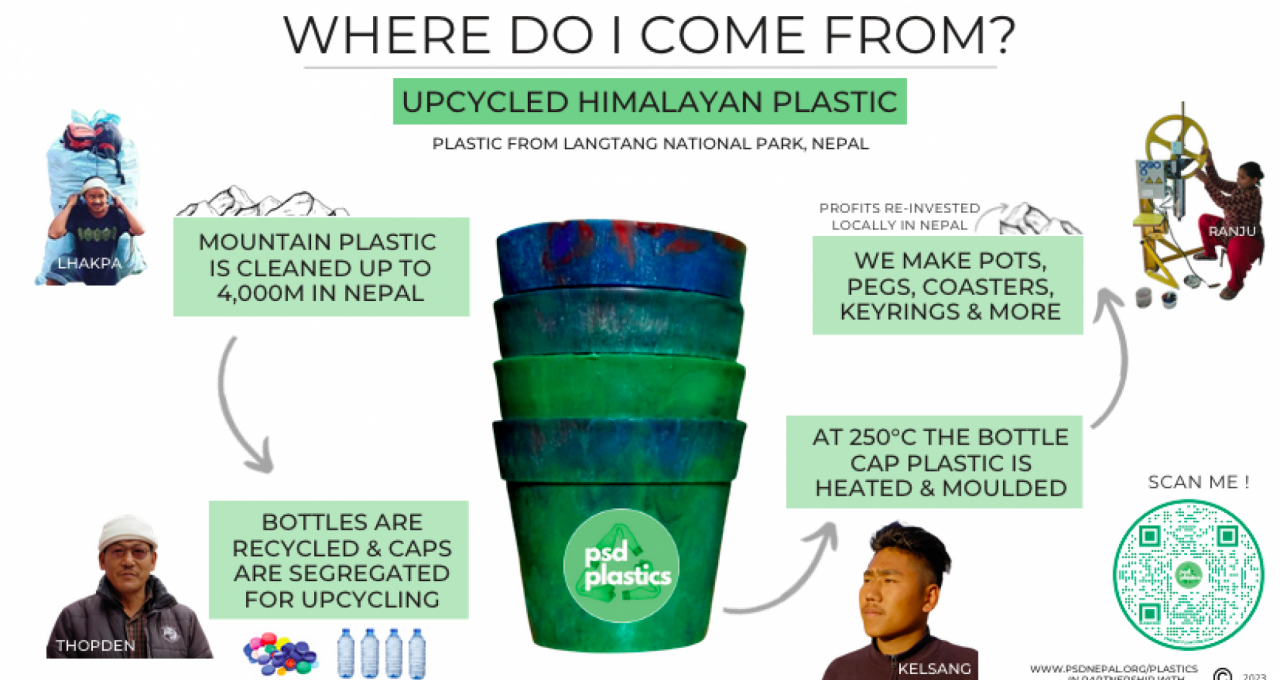
Plastic segregation

PET for recycling ! HDPE for upcycling !
This is all you have to remember... We recycle PET bottles by collecting them in Langtang Valley and transporting them to Himalayan Plastic (Pvt Ltd) in Pokhara, for recycling into rPET which is reused in new bottles for drinking water in Nepal. The bottle caps (made of HDPE), we collect and sort and segregate by colour to make a lovely array of upcycled products - as you can see below - from flowerpots and coasters to pegs, keyrings, and more.
Visit PSD Office in Kalanki (Kathmandu) or our shop at Pairo (Hotsprings) on the Langtang Valley trek to get your hands on some of these products !
PET for recycling ! HDPE for upcycling !
This is all you have to remember... We recycle PET bottles by collecting them in Langtang Valley and transporting them to Himalayan Plastic (Pvt Ltd) in Pokhara, for recycling into rPET which is reused in new bottles for drinking water in Nepal. The bottle caps (made of HDPE), we collect and sort and segregate by colour to make a lovely array of upcycled products - as you can see below - from flowerpots and coasters to pegs, keyrings, and more.
Visit PSD Office in Kalanki (Kathmandu) or our shop at Pairo (Hotsprings) on the Langtang Valley trek to get your hands on some of these products !
Upcycled plastic products
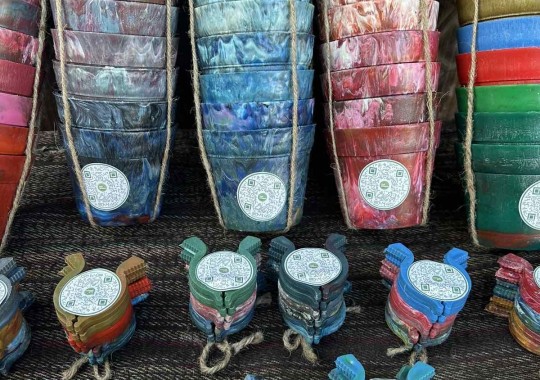
In partnership with our upcycling partners (see below) PSD Nepal has launched a stream of upcycled plastic products under the banner of "PSD Plastics". We are taking HDPE plastics from the bottle caps of waste plastic bottles collected in Langtang National Park (Rasuwa). Whilst the bottle (PET) is recycled, the bottle caps (HDPE) are upcycled. First the plastic is crushed and flaked. Then with an injection moulding machine, we make flowerpots, tea coasters, clothes pegs, key rings, and more out of this plastic. Contact our office in Kathmandu for these products!
Initiative partner: https://ennovent.com/
Hardware partner: https://plasticpreneur.com/
In partnership with our upcycling partners (see below) PSD Nepal has launched a stream of upcycled plastic products under the banner of "PSD Plastics". We are taking HDPE plastics from the bottle caps of waste plastic bottles collected in Langtang National Park (Rasuwa). Whilst the bottle (PET) is recycled, the bottle caps (HDPE) are upcycled. First the plastic is crushed and flaked. Then with an injection moulding machine, we make flowerpots, tea coasters, clothes pegs, key rings, and more out of this plastic. Contact our office in Kathmandu for these products!
Initiative partner: https://ennovent.com/
Hardware partner: https://plasticpreneur.com/

Environmental Education Sites (EES)
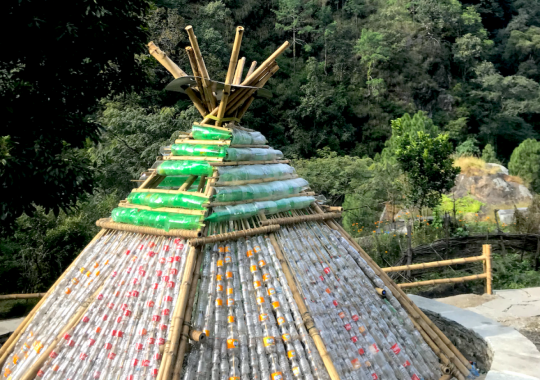
Upcycled and constructed in the autumn of 2019, in Langtang National Park, the first Environmental Education Site (EES) consists of a large PET Plastic Pavilion - a 'pause point' both for locals and for the 18,000 annual trekkers to Langtang.
Made of 2,447 bottles collected in the Park - from paani (water) bottles to Coca-Cola, Fanta, Sprite, Mountain Dew, and the like - the PET Pavilion is a moment for respite on the busy trek to Langtang, Kyanjin Gompa, and Gosaikunda. The PET pavilion asks questions of us all. How can we work together to keep our rivers clean? How can we segregate waste better? How can we think in a cradle-to-cradle circular way?
Visit the National Park and see the PET Pavilion in Tiwari: www.what3words.com/avocado.clarinet.alleges
Upcycled and constructed in the autumn of 2019, in Langtang National Park, the first Environmental Education Site (EES) consists of a large PET Plastic Pavilion - a 'pause point' both for locals and for the 18,000 annual trekkers to Langtang.
Made of 2,447 bottles collected in the Park - from paani (water) bottles to Coca-Cola, Fanta, Sprite, Mountain Dew, and the like - the PET Pavilion is a moment for respite on the busy trek to Langtang, Kyanjin Gompa, and Gosaikunda. The PET pavilion asks questions of us all. How can we work together to keep our rivers clean? How can we segregate waste better? How can we think in a cradle-to-cradle circular way?
Visit the National Park and see the PET Pavilion in Tiwari: www.what3words.com/avocado.clarinet.alleges
Site visits
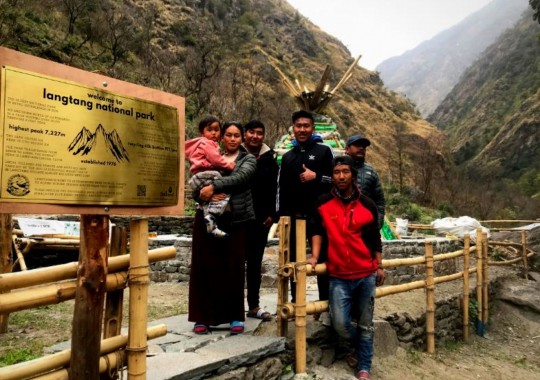
The PET plastics pavilion is now hosting 40 international trekkers and tourists per day in Tiwari, Langtang National Park
With around 18,000 annual visitors to the Langtang Park, the PET house is attracting over half of these to visit, learn, and interact with the upcycling work of PSD Nepal in Langtang. The tourist season runs from September-November and February-April with over 1 million tourists coming to Nepal to visit the Himalaya and trek in the mountains. The PET plastic house is the first of five installations by PSD Nepal, provoking the imaginations of visitors and asking important questions of our times - how will we interact with the natural world? What role will we let plastic play in the environment? How can we plan well for the future?
The PET plastics pavilion is now hosting 40 international trekkers and tourists per day in Tiwari, Langtang National Park
With around 18,000 annual visitors to the Langtang Park, the PET house is attracting over half of these to visit, learn, and interact with the upcycling work of PSD Nepal in Langtang. The tourist season runs from September-November and February-April with over 1 million tourists coming to Nepal to visit the Himalaya and trek in the mountains. The PET plastic house is the first of five installations by PSD Nepal, provoking the imaginations of visitors and asking important questions of our times - how will we interact with the natural world? What role will we let plastic play in the environment? How can we plan well for the future?
Education
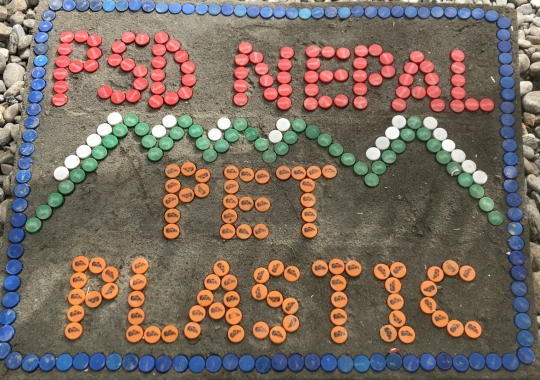
How can we use upcycled plastic to stimulate imagination and creativity?
In Rasuwa district, PSD Nepal conducts educational classes on waste, recycling, segregation, and environmental health, using PET bottle caps. Plastic PET bottle caps can be used to spark imagination and open conversations on the environment. From fruit and trees and rhododendrons to rivers, glaciers, mountains, and hydro projects - the vision of school students is limitless!
Watch something of this work online here and learn more about this work through our online presentation.
How can we use upcycled plastic to stimulate imagination and creativity?
In Rasuwa district, PSD Nepal conducts educational classes on waste, recycling, segregation, and environmental health, using PET bottle caps. Plastic PET bottle caps can be used to spark imagination and open conversations on the environment. From fruit and trees and rhododendrons to rivers, glaciers, mountains, and hydro projects - the vision of school students is limitless!
Watch something of this work online here and learn more about this work through our online presentation.
RDF Fuel

Upcycling to RDF fuel is facilitated by a technical team from NAST, headed up by Dr Rabindra Dhakal. Dr Dhaka was previously senior scientific advisor to the Prime Minister of Nepal. NAST promotes creative re-purposing of waste materials, as well as upcycling. NAST also focus on the educational opportunities to grow scientific knowledge and improve awareness.
NAST employs a pyrolysis machine to convert plastic waste to fuel. Plastic waste including plastic bags, wrappers, styrofoam, etc. are converted with 80% efficiency into RDF (reduced diesel fuel). This upcycling process demonstrates a high level of efficiency, with 1kg of plastic waste converted into c.0.8L of RDF fuel.
This project is currently in pilot phase.
Upcycling to RDF fuel is facilitated by a technical team from NAST, headed up by Dr Rabindra Dhakal. Dr Dhaka was previously senior scientific advisor to the Prime Minister of Nepal. NAST promotes creative re-purposing of waste materials, as well as upcycling. NAST also focus on the educational opportunities to grow scientific knowledge and improve awareness.
NAST employs a pyrolysis machine to convert plastic waste to fuel. Plastic waste including plastic bags, wrappers, styrofoam, etc. are converted with 80% efficiency into RDF (reduced diesel fuel). This upcycling process demonstrates a high level of efficiency, with 1kg of plastic waste converted into c.0.8L of RDF fuel.
This project is currently in pilot phase.